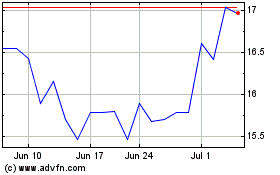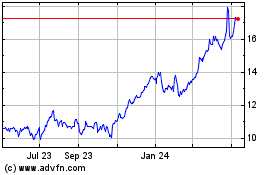By Jenny Strasburg
This article is being republished as part of our daily
reproduction of WSJ.com articles that also appeared in the U.S.
print edition of The Wall Street Journal (September 20, 2018).
A senior investment banker at Deutsche Bank AG recommended
earlier this year that the troubled German lender consider breaking
itself up, and other long-term strategic options, to address its
persistent competitive weaknesses, according to people familiar
with the matter.
The proposal came from Charlie Dupree, Deutsche's head of
mergers and acquisitions in the Americas before he left for
JPMorgan Chase & Co. in June. His analysis, produced with other
bankers over several months, was for internal purposes and wasn't
intended to be made public, according to the people.
In April, Mr. Dupree shared his conclusions with Deutsche Bank's
chief financial officer, James von Moltke. The finance chief
considered the analysis well-intended but superficial, a person
familiar with his feedback said.
Even so, the recommendations from a top deal-maker who had been
with the bank since 2006 indicate how deep a rut Deutsche Bank is
in. The firm faces high funding costs and a depressed share price,
reflecting investor doubts about a turnaround.
Mr. Dupree's analysis suggested a breakup of the bank could
eventually allow the investment-banking business, through a spinoff
or public stock offering, to tap its own sources of funding, people
familiar with the matter said. The banker, in his analysis and
related conversations, also suggested a merger was increasingly
likely for Deutsche Bank -- a view echoing widespread skepticism
about the lender's ability to compete alone in the long-run.
Bankers, investors and analysts consider the most likely partner
to be German rival Commerzbank AG.
Neither bank has directly addressed potential merger plans.
There's no indication a deal is actively being planned, according
to people inside and close to the bank. Deutsche Bank's supervisory
board for now is sticking with the current structure and strategy,
the people say. But the persistent speculation, much like Mr.
Dupree's views, reflects debates that swirl continuously in and
around the lender.
Over the past three years, Deutsche Bank has undergone multiple
restructurings, suffered an exodus of senior executives, and faced
some of the harshest reprimands from regulators dealt any major
investment bank.
The Wall Street Journal reported in May that the U.S. Federal
Reserve last year designated Deutsche Bank's sprawling U.S.
business in " troubled condition," a rare slap-down.
As its shares have fallen and credit-ratings firms have
downgraded its debt, Deutsche Bank's funding costs have risen,
making profits harder to come by. Executives say they're focused on
lowering those funding costs.
Questions about the bank's strategy and readiness to withstand
financial and economic shocks are constant, people close to the
bank's operations say.
This week, Chief Executive Christian Sewing is in Washington,
D.C., to meet with U.S. regulators for the first time since he
became CEO in April, some of the people said.
He'll be joined by Sylvie Matherat, the bank's chief regulatory
officer and a management-board member, the top executive
responsible for the bank's relationship with the Fed and other key
overseers.
Mr. Sewing, Ms. Matherat and their peers on the management board
have sought to reassure investors that the bank's strategy is on
course, acknowledging that they must fulfill cost-cutting targets
and other promises.
Mr. Dupree's take on the need for deeper structural change
didn't gain much traction inside the bank.
In March, he sent his analysis to his New York boss, Mark
Fedorcik, U.S.-based co-president of the investment bank. Mr.
Fedorcik says he hasn't reviewed the analysis and declined to
comment.
In April, Mr. Dupree met in Frankfurt with Mr. von Moltke. The
meeting came at a tumultuous time. Deutsche Bank had just fired its
CEO and appointed Mr. Sewing, a longtime Germany-based executive.
Senior executives told investors and clients that Deutsche Bank
would deepen its home-market focus but maintain a global presence,
while cutting certain businesses, costs and staff.
Also in April, bank executives rejected a shareholder proposal
pressing the lender to explore splitting the investment bank from
the retail-banking unit. Executives said the option would cause
"inferior economics and strategic outcomes" and "is not possible in
the near-term."
Mr. Dupree conceded that his analysis wasn't fully baked, a
person familiar with his thinking said. For one thing, he singled
out the flagging performance of Deutsche Bank's markets business as
a major hurdle to attracting investors to a spun-off investment
bank, but didn't have easy answers for improving performance, one
of the people said.
Mr. von Moltke welcomed the input, according to people familiar
with his feedback, but felt that M&A bankers like Mr. Dupree
are prone to want to break up companies and look to solve problems
with deals. Mr. von Moltke shelved the report without discussing it
with other bank executives.
In June, JPMorgan announced it had hired Mr. Dupree. His
departure from Deutsche Bank was unrelated to the internal
analysis, a person close to him said.
Write to Jenny Strasburg at jenny.strasburg@wsj.com
(END) Dow Jones Newswires
September 20, 2018 02:47 ET (06:47 GMT)
Copyright (c) 2018 Dow Jones & Company, Inc.
Deutsche Bank Aktiengese... (NYSE:DB)
Historical Stock Chart
From Mar 2024 to Apr 2024

Deutsche Bank Aktiengese... (NYSE:DB)
Historical Stock Chart
From Apr 2023 to Apr 2024
